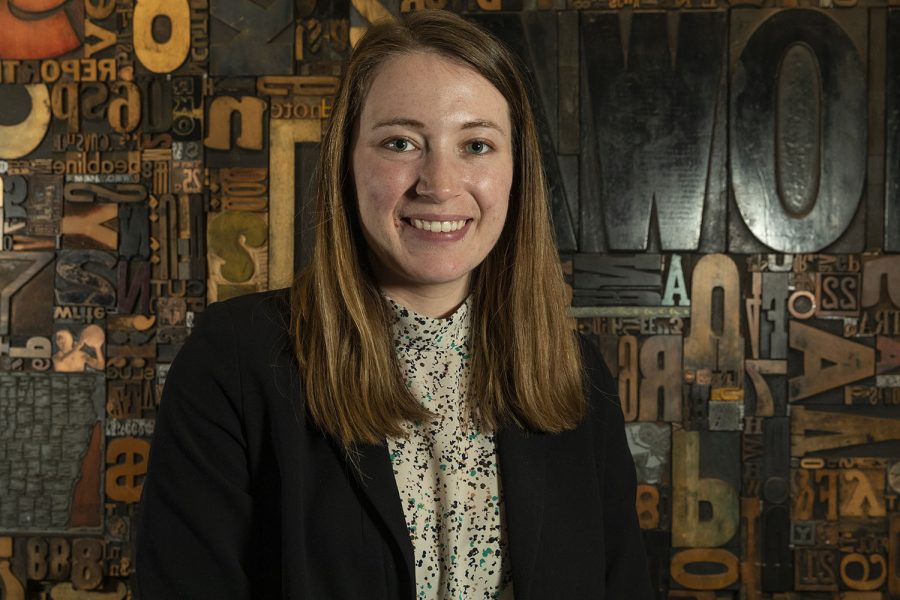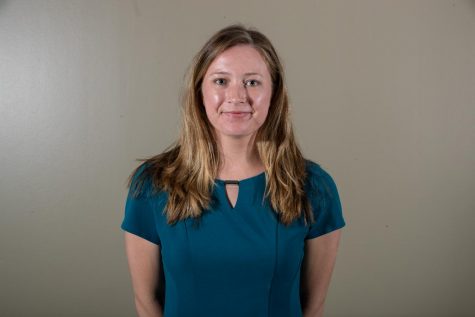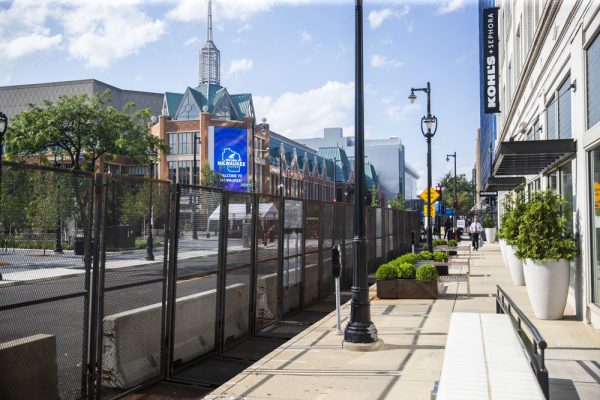Letter from the Editor | We’ll get back to normal right? It never happened that way
One year into the pandemic, an end is in sight. But the virus will forever leave its mark on our campus.
Daily Iowan Managing Editor Sarah Watson poses for a portrait inside Adler Journalism Building on March 3, 2020, the day she was selected as the next year’s executive editor. Two weeks later, staffers would clear out their desks and produce a paper remotely.
March 16, 2021
One year ago, on March 17, Iowa Gov. Kim Reynolds issued a State Public Health Emergency.
One year ago, on March 18, the University of Iowa shut down campus for the entire spring semester. After heading home for an extended spring break mere days before, the UI told on-campus students to clear out their rooms. Faculty and staff were asked to work remotely if their jobs allowed. We weren’t coming back.
One year ago, our sense of what was normal turned upside down, inside out, and backwards. It’s been a year of covering closures, reopenings, and closures again for The Daily Iowan. A year of Zoom, masks, vaccines, lost loved ones, and new hobbies.
On my last day of class before our scheduled spring break, a classmate asked our professor if the rumors were true that we wouldn’t have in-person classes for the rest of the semester. The UI hadn’t yet made the announcement, but we knew we’d be doing online classes for two weeks after the typically travel-heavy break.
Our professor assured us he was planning on seeing us again in two weeks.
I turned to my friend, a public health major, and in a low voice asked the same question.
He chuckled, in the way a lot of us laughed at the absurdity of thinking about work and class while surviving in a world with a new, deadly virus.
Nope, he said.
One year later, more than 5,600 Iowans have died of the virus.
I, and several of my colleagues, mistakenly thought we’d be back on track if not by Easter, as former President Trump maintained, but by the summer. Surely, by the fall, we would achieve some sense of normalcy.
But we continued our checkered Zooms for classes, for interviews, for meetings. Fellow students brought cats, kids, wall decor, Wi-Fi glitches, and invisible struggles at home into our world of virtual connections.
Former DI editor Marissa Payne was out grocery shopping — the first time she’d done so in weeks after putting out breaking news updates near hourly — when the UI announced graduation would be moved online.
Payne understood the reasoning behind the decision to mitigate transmission, but her status as a first-generation student meant the loss of the typical milestone hit home hard.
“My heart wasn’t only breaking for me, but you know, my parents went through so much just to get me to college and to make sure I had opportunities that they didn’t,” she said.
In this edition you’ll find stories of resilience, of hardship, of a path forward one year later.
One COVID-19 researcher helped resurrect an engineered breed of mice that could develop COVID-19 symptoms that led to development of a vaccine and COVID-19 treatments.
Knowing her students may not be returning home for Thanksgiving break, one professor cooked and packaged up turkey and potato meals for UI students who didn’t have a place to go.
Higher education institutions are facing drops in college-aged students and a hostile Legislature, meaning at places like the UI, alternative funding sources for the strategic plan seem to have become the only way forward. It’s a timeline accelerated by the pandemic.
New online flexibility for services like online supplemental instruction for distance students and activities like bringing high-profile lecturers to campus with the click of a button instead of an airplane flight may stick around post-pandemic.
The Asian Pacific American Cultural Center spearheaded discord hours and online activities — like an online event teaching how to make mochi, a Japanese rice cake — to maintain a “home away from home.”
Facing low foot traffic, one Iowa City vintage store turned to online sales and social media promotion to find a niche for their product.
One area nursing home — having avoided the deadly virus by sheer luck and thorough preparation — held an outdoor flash mob for a 100-year-old resident to celebrate their birthday. Now, they’re returning to communal dining and movement between rooms as residents and staff are vaccinated.
We certainly didn’t get “back to normal” as quickly as we would’ve liked. A year later, the DI remembers all we’ve lost, and what we’ve learned from the pandemic.
















